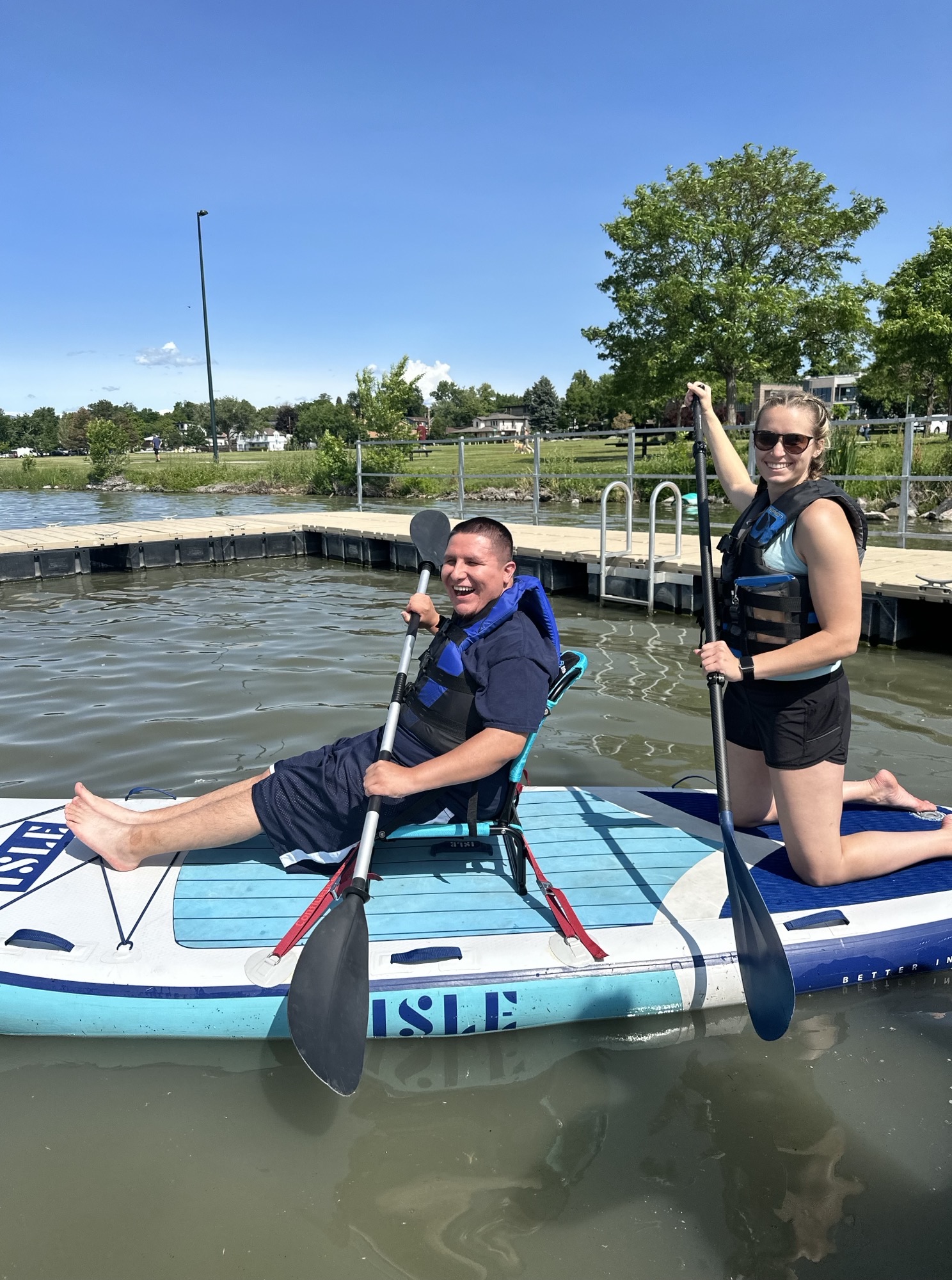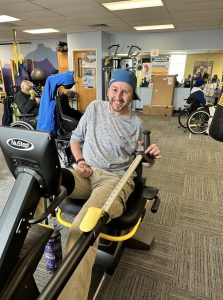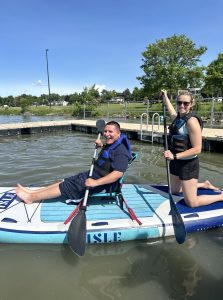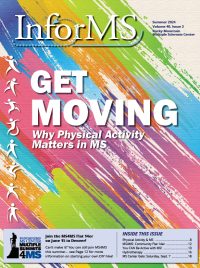
With an Eye on Adaptations, Finding Activities You Enjoy Might Be Easier than You Think
Hopefully this issue has already convinced you that you SHOULD be active, but what about when you’re unable to be active in the ways you previously enjoyed? It’s important to know that you can still be active while living with MS, sometimes it just means adapting HOW you’re active.
With a little forethought and creativity, it’s possible to adapt or replace most valued activities if you’re unable to participate in the ways that you’ve been used to. Studies show that this can contribute to long-term happiness and quality of life. One study in The Journals of Gerontology found that adults who replaced a lost activity had higher positive affect levels (the extent to which an individual subjectively experiences positive moods such as joy, interest, and alertness) one year after illness onset than those who didn’t replace activities, and they experienced less emotional disturbance from having to reduce or give up valued activities.

Many gyms and recreation centers offer adaptive equipment, like the reclined stationary bicycle shown above at the Rocky Mountain MS Center’s King Adult Day Enrichment Program (KADEP).
There are many ways to adapt activities. You may choose to do something less often or for a shorter amount of time in one sitting, or to decrease the expenditure related to an activity. If you enjoy gardening but it’s getting overwhelming, consider getting raised beds or planters to limit the amount of bending you have to do. You may also consider lowering the intensity of a physical activity. If you want to get outside, you might choose a shorter path that’s not as hilly to reduce your energy expenditure. Doing something is always better than doing nothing, even if that “something” is less than you’d like.
You can look for ways to optimize how you participate in an activity so that it is more accessible to you. Some possibilities include devoting more time to stretching before or after an activity or including more breaks and pacing. Planning ahead may also be beneficial to help you think through your priorities and the strategies you can use to ensure that you are able to do what’s most important to you. For instance, if you know that getting active outside is the most important thing to you in a day, you may plan to go out in the early morning to avoid heat and take your walking poles or use your wheelchair to conserve energy. To help with the rest of the day you can make sure to have a plan to pick up lunch on the way home or have something easy to grab already prepared in the fridge and you can space out the household chores you need to do on other days in the week so that you can rest after the activity.
You can also compensate for limitations with special equipment, additional support, or a change in how the activity is performed. There is a wide range of specialty equipment available nowadays that allows for adaptation of many fitness activities. You may even be able to adapt household items to help you with an activity. For instance, while taking a seated exercise class, you could place a towel under your foot to allow for more leg movement. You can use gripping gloves to help with hand strength or use wrist weights if holding dumbbells is difficult.
Adaptations Specific to MS:
- Fatigue – You may need to take more breaks during an activity, or break it up into smaller chunks. For instance, you could exercise in three 10-minute sessions instead of one 30-minute session. Consider if there are other tasks in your day where you can conserve energy so that you have more energy leftover for the hobby or workout that you want to do. Perhaps you pull a chair into the kitchen so you can sit during meal preparation or you cook a freezer meal after an activity, cluster your errands together, or experiment with timing activities throughout the day to see what works best for you. Everyone is different and different techniques work for different people so don’t be afraid to keep trying until you find what works for you. Check out “The Four Ps of Energy Conservation” with MS-Specialty Physical Therapist Michele Harrison (available on the MS Center’s YouTube Channel at Tinyurl.com/informs-fourps).
- Heat – Be aware of the effect that heat can have on your body. Some people are “heat sensitive” and their body feels heavier and more fatigued once they are warm, or previous symptoms may reappear in a “pseudo-relapse,” also known as recrudescence. This is a temporary recurrence of old symptoms due to infection, overheating, physical or emotional stress, or other causes. Please check out the Fall 2022 issue of InforMS for more information about pseudo-relapses (available at MSCenter.org/informs). If you experience this while exercising, it is important to consider your previous MS symptoms, especially if they affect vision, balance, or muscle strength, so that you can stay safe while exercising. To combat overheating, you may choose to wear cooling apparel, workout inside or during cooler parts of the day, avoid humidity, or carry a small fan. Watch “Beat the Heat – Summer Living with MS” for more ideas (available on the MS Center’s YouTube Channel at Tinyurl.com/informs-beattheheat).
- Mobility – If your main concern with an activity is related to your mobility, you may want to consult with a specialist like a Physical or Occupational Therapist for adaptations specific to you. There are many seated versions of fitness classes available on YouTube such as the seated Online Adaptive Exercise Classes offered by the RMMSC, other seated yoga, stretching, dance, and cardio classes, and MS specific adaptive exercise channels like The MS Gym. You will want to consult with your healthcare provider before starting any new fitness routine and be sure that the online instructor you choose is a qualified professional. If you have any questions about whether or not you should be performing a move, skip it and speak with your provider before continuing. You can also look for adaptive recreation resources in your local area. Many Parks and Recs departments have specialty programming. Try searching “adaptive -your hobby or activity- in -your city or county-” on Google. There is often special equipment to make a sport or activity like biking/skiing/hiking/fitness classes work for your level of mobility, but that equipment can be expensive. When you connect with a local organization who owns that equipment, the activity can be made affordable and accessible to you. If you experience a loss of muscle function in part of your body, you may be considered to be living with paralysis (you do not need to be unable to walk) and have access to resources through the National Paralysis Resource Center (available at Tinyurl.com/informs-paralysis), including an Information Specialist who can “answer inquiries ranging from finding rehabilitation facilities, to deciphering insurance issues, to locating an adaptive scuba diving program, and everything in between.”

Adventure Recreation, a key component of KADEP’s therapeutic recreation activities, is another area where adaptation is common. From paddleboarding in the summer to skiing in the winter, a little digging can get you in touch with the right organizations to let you participate in the things you love while meeting your personal needs.
If you’re having a hard time imagining how you could possibly continue an activity that you used to participate in, consider what aspect you enjoyed most about it or what you gained from it. Are there other ways to get that feeling? Can you volunteer in some way that is less physically demanding? Instead of playing soccer, what about becoming a soccer coach? You’ll still be getting out of the house, enjoying social and leisure time with others, be part of a team, and you can share your knowledge and skills. It is not an all-or-nothing situation, there are always adaptations that can be made on a continuum.
Don’t measure your current self and ability level against what other people are doing or what you were able to do in the past. Multiple sclerosis may change the way that you do something, but it doesn’t mean you can’t do the activity at all. Work with where you are today and create a customized plan to move forward.
Consider which other pillars of wellness are affecting you. It can be difficult to incorporate more physical activity in your day when you don’t have the energy for it and many other areas of wellness may be affecting your energy. Are you eating a variety of nutritious foods throughout the day? Are you getting restful sleep? Are you experiencing moments of pleasure and joy in your daily life? If your answer is no to any of these, you may want to consider what other small improvements you can make in these areas. It’s all connected. When you make small improvements in one area, you may experience benefits in other areas. Eating better food improves fatigue, which allows for the energy to be more physically active, which improves sleep, which also improves fatigue and influences healthy eating choices and so the cycle goes on and on!
Things may look different day-to-day. You’ll likely experience “good” days and “bad” days, high energy days and low energy days. Give yourself grace on the days that feel off. Think about multiple options in advance and have ideas for different levels of activity based on what you’re feeling. Think about the bigger picture. You want to be able to stay consistently active and you don’t want to injure yourself. When you dial it back on a day that you need to, you allow your body to rest which allows you to feel better the next day. If you push too hard on an “off” day, you may feel depleted for more days to come, or you may experience an injury that has longer lasting effects.
When you choose to adapt an activity rather than forgoing altogether, it allows you to stay in control. You still get to decide what you’re doing and how you’re doing it. Having multiple sclerosis doesn’t mean that you can’t participate in the activities you love, but it might mean that you have to change the ways that you do them. Get curious about why you enjoy an activity and creative in finding ways to hold onto those aspects while adapting to your current abilities.
Kelsey Morrow, NBC-HWC, the MS Center’s Education Manager, is a National Board Certified Health & Wellness Coach. She brings her expertise regularly to the MS Center’s MS 101 classes, Community Forums, and a host of other education programs.







